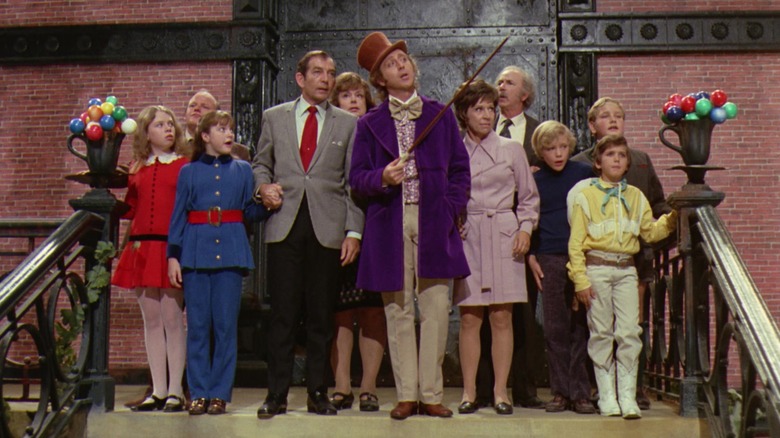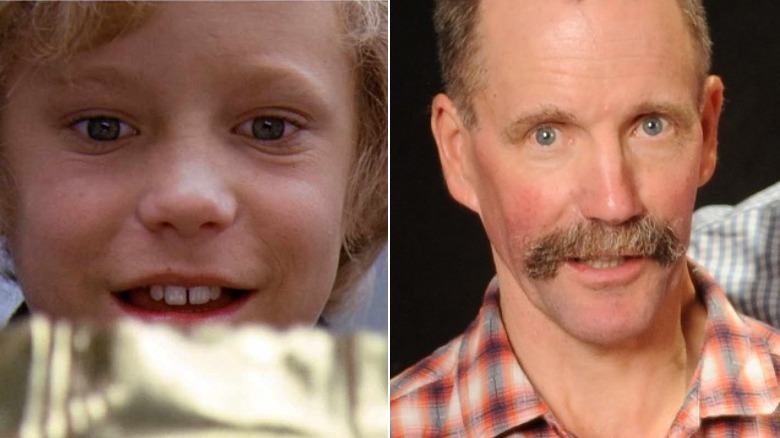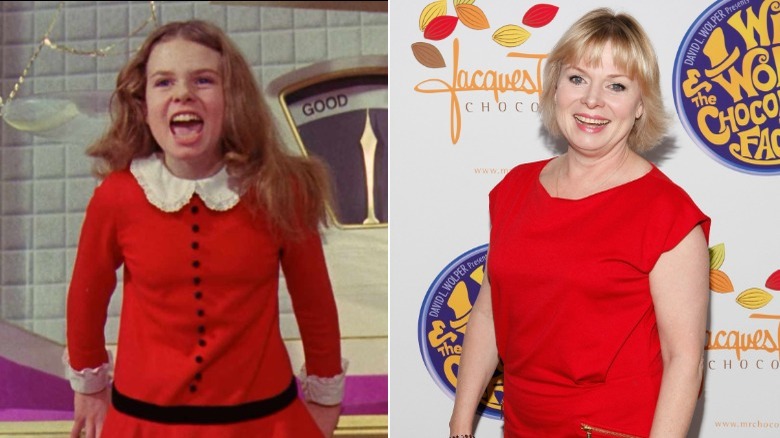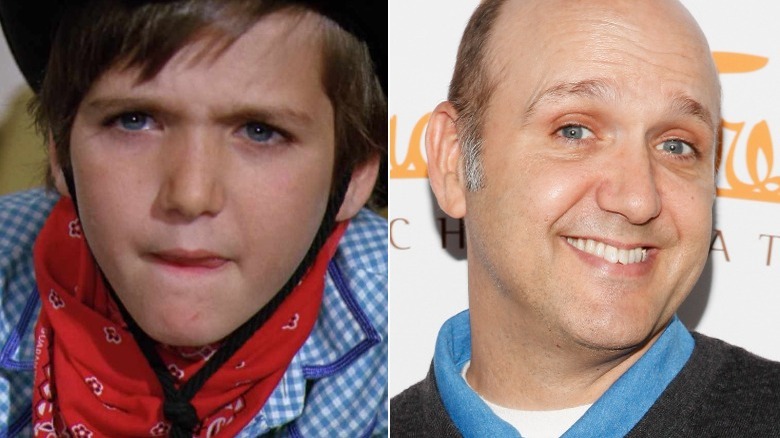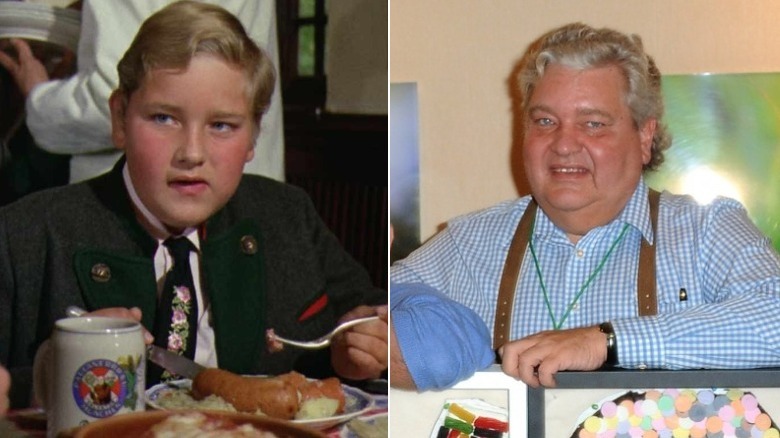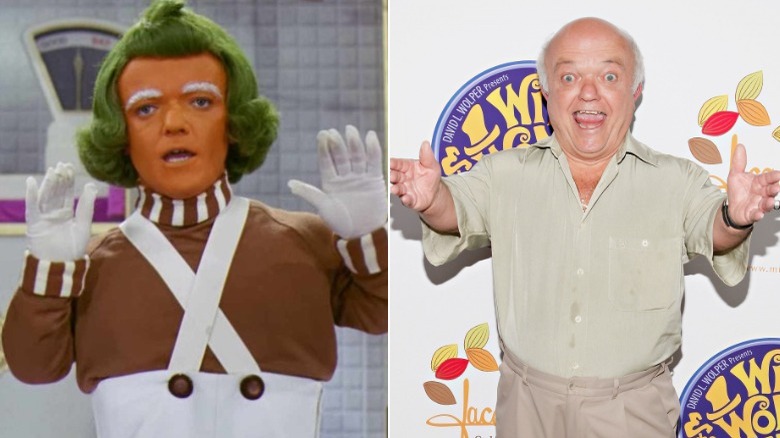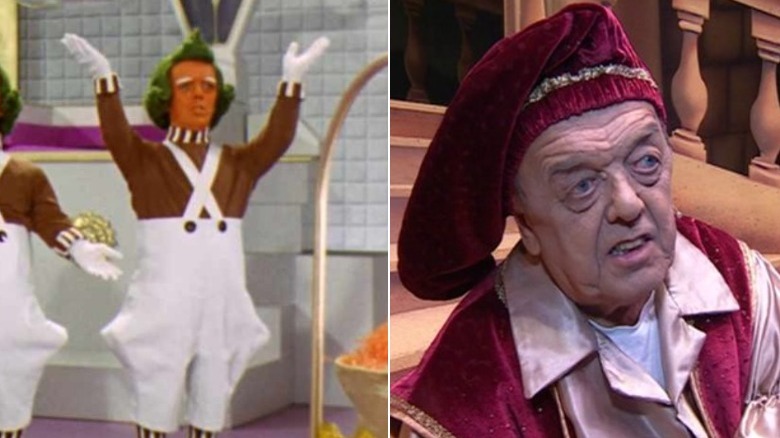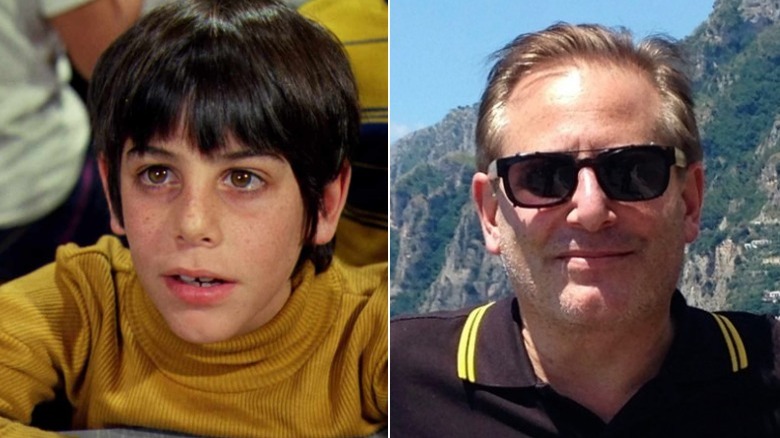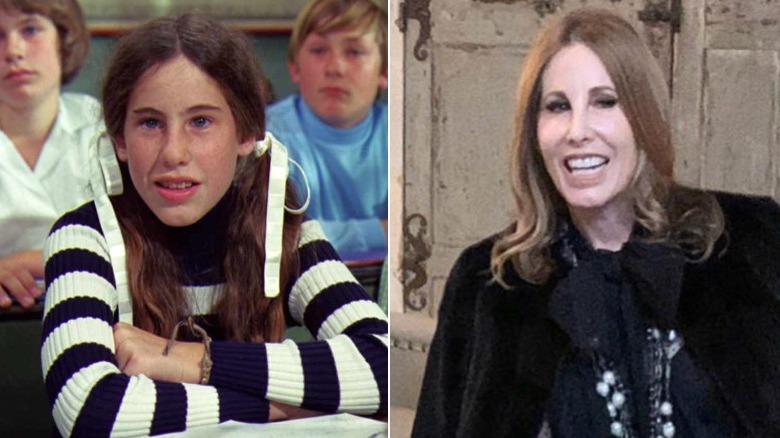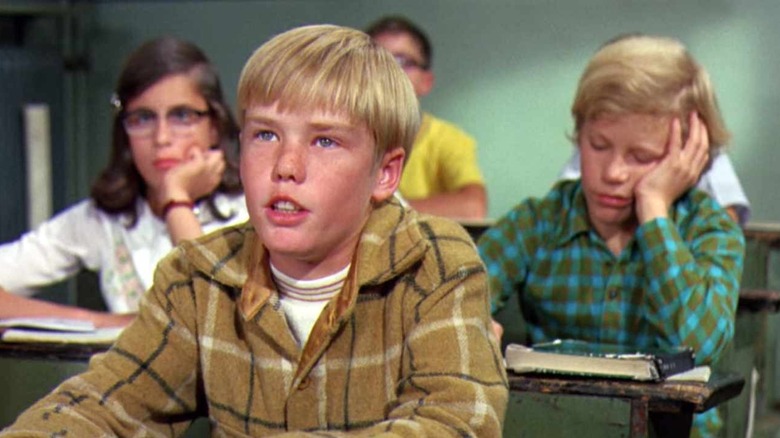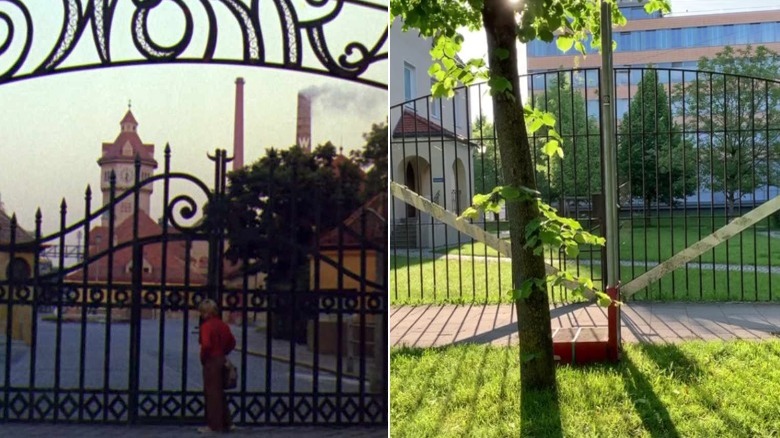The Only Actors Still Alive From The Willy Wonka And The Chocolate Factory Cast
Roald Dahl's 1964 novel "Charlie and the Chocolate Factory" was an instant classic work of children's literature, and when it was turned into a film seven years later ... it wasn't exactly an instant classic. But many television broadcasts and home video viewings later, the 1971 Mel Stuart film (bankrolled by Quaker Oats) "Willy Wonka & the Chocolate Factory" rightfully took its place in the pantheon of film history, beloved and perhaps almost as revered by both children and adults as "The Wizard of Oz."
Gene Wilder deliciously played the title candyman with pure imagination, and when Wonka decided to open the gates of his chocolate factory to five Golden Ticket winners and their guardians, the colorful fun and insanity began, with the assistance of ten orange Oompa Loompas. 100 golden goosed-minutes later, wicked lessons are learned in the twisted fairytale, as one's belly aches with both laughter and hunger. The film inspired actual candy bars, a '90s alternative band, a Tim Burton version, and the Timothée Chalamet prequel.
While most of the adult cast, including the indelible Wilder, have since passed on, several key players still carry on the sweet legacy of the film. Dawn Julie Cole, who played spoiled rotten rich girl Veruca Salt, said in her memoir, who "could imagine the impact and influence 'Willy Wonka' would have on our lives. An experience as everlasting as Mr. Wonka's legendary Gobstoppers. A timeless, ageless story that ends happily ever after." Let's unwrap and take a bite into the lives of the only actors still alive from the Willy Wonka & the Chocolate Factory cast.
Peter Ostrum (Charlie Bucket)
Peter Ostrum was a 12-year-old Cleveland boy, plucked from obscurity and given a golden ticket to play the role of a lifetime, opposite Gene Wilder and Jack Albertson in "Willy Wonka & the Chocolate Factory." Reflecting in a 2003 documentary, he said, "Charlie Bucket and Peter Ostrum, in many ways, I guess are similar. Charlie is very honest, eager, but not pushy. Confident, yet very humble. And Charlie made good choices." After Wonka wrapped, Ostrum turned down a three-picture deal and made the choice to walk away from acting, forever.
He told Syracuse.com, "Everybody could be so lucky to have an experience like this and then to go in a completely different direction." That direction started when he returned home after filming; his family acquired a horse he liked to take care of, and when a veterinarian came to visit, "it made a huge impression on me," seeing someone who "really enjoyed what he did for a living." He graduated from the College of Veterinary Medicine at Cornell University in 1984, and Dr. Ostrum currently works at Countryside Veterinary Clinic of Lowville, New York.
Outside of visits to local schools, Ostrum had long hid from his fame, even lying to say it was his brother who played Charlie Bucket. He had a change of heart later in life, telling Oprah's "Where Are They Now," that he "really didn't appreciate the significance of the film until I had children of my own. They saw the film, they were interested in it." He has since made more public appearances with his castmates, who are "like family" and he forever shares "a special bond" with.
Julie Dawn Cole (Veruca Salt)
No ticket winner deserved less than the bratty Veruca Salt did, who Dahl named after a wart on a foot — Verruca Plantaris. Perfectly poutily portrayed (and sung) by non-chocolate lover Julie Dawn Cole, the character's "nasty nature didn't come easy to" the young actress, thanks to the "exceptional parenting" by her mother (via her fittingly titled memoir "I Want It Now!")
Cole may have been spoiled by her movie father Roy Kinnear "both on-screen and off," but she went on to have a well-grounded life. Cole became a household name in Britain when she moved into more adult roles like the series "Angels," "Poldark," "The Mill on the Floss" and "Emmerdale Farm," as well as work in theater. Raising two children as a single mother had her looking for more stability in a career, and so she branched out as a theatre teacher for children, a fitness instructor starting in 1999, and then became a psychotherapist a decade later.
Cole still keeps busy peppering the world with a pinch of Salt — appearing at fan fests, screenings, giving shoutouts to anyone who is a "good egg or a bad egg" via Cameo, and teaming with Ryan Hardy for the therapeutic comedy "Willy Wonka Explained: The Veruca Salt Sessions." She kept props from the film, like Golden Tickets, a Scrumdiddlyumptious bar, a golden egg, and still keeps tabs with her former co-Wonkerers, even attending Oompa Loompa Rusty Goffe's 2019 nuptials. Cole was very close with her "blueberry sister," Violet Beauregarde portrayer Denise Nickerson (who she once had rivaling on-set crushes on Peter Ostrum), and before she died was able to visit with her and "sang songs — 'Willy Wonka' of course! And that made her smile and laugh."
Paris Themmen (Mike Teevee)
Paris Themmen was the youngest of the lucky ticket holders, and apparently not the easiest to work with, which suited his mouthy, cathode-ray tube obsessed character Mike Teevee. In a television interview during filming, Gene Wilder said this of the younger actors — "Four of them are fantastic, the other one I'm going to shoot in the head tomorrow." Luckily it never came to that (although tiny Mike Teevee exited the movie in his mom's purse), but when Themmen briefly reunited with Wilder 40 years later at a charity screening of his film "Silver Streak," he signed a poster for him "To my favorite brat."
While he did go on to study theater at New York University and work here and there in the entertainment industry, Themmen also dabbled in real estate, at Walt Disney Imagineering, as a financial consultant for Smith Barney, as well as starting a few companies of his own. In 2018, Mike Teevee appeared on TV's "Jeopardy!" and neither Alex Trebek nor Themmen made any mention about "Wonka," but instead mentioned him being an entrepreneur and avid backpacker, visiting, at the time of taping, 61 countries. He's definitely not hiding his past, as he interacts with fans at conventions, "Wonka" screenings, Cameos, and sells autographed items on his own Wonka Shop.
Michael Böllner (Augustus Gloop)
The "Wonka" filmmakers not only found a place to shoot in Munich, Germany, but also their Augustus Gloop there as well. Local Michael Böllner was cast as the gluttonous boy, and he was given a dialogue coach to help with his English. He didn't even need a dressing room because he dressed in costume at home, living only 30 minutes away from the studio.
While the role had him falling into a chocolate river, it wasn't such a sweet time for Böllner, who told Polygon, "It was actually not chocolate. It was terribly cold. It was stinky water! And it was all day long, jumping in and jumping out, and being around with wet clothes." The part that followed, where he was building up pressure stuck in a tube, wasn't much of a cakewalk either, as he "couldn't move anything. I couldn't do anything. I just had to rely on the guys that were around me that don't drop me."
Two minor roles on German TV followed, but his father sent him back to school, where he studied business administration, and in 1991, he opened his own Munich law firm that specializes in taxes, where "Mr. Böllner is always there for you."
Due to the lack of popularity of the film in his home country, Böllner wasn't well known for his role, and when his castmates were beginning to reunite in the 1990s, they had trouble tracking him down, evening putting "an advertisement in German newspaper that read, 'Augustus, Show a Sign.'" He now will strap on lederhosen anytime and is happy to speak (with a solid command of English) of his Gloopy work. And yes, he still has a sweet tooth, telling ABC 6 Philadelphia that not only does he still drink chocolate milk, but he does so "quite a lot."
Rusty Goffe (Oompa Loompa)
Out of the ten original Oompa Loompas, two remain and Rusty Goffe is perhaps the most accomplished and outspoken of them, proclaimed as the United Kingdom's number 1 dwarf. In a 2005 interview with The Guardian, Goffe said that "Willy Wonka was my first and favorite film" and revealed that "amazing dance routines" were originally choreographed, but "he had to change them to suit our short legs." Upon the 2016 passing of Gene Wilder, Goffe said "He had a magical aura about him and it really showed," adding that the cast, young and old formed "a big family, a lovely family and Gene was the father of it."
Post-Wonka, Goffe had quite the fruitful career with over 50 credits on film and television, as well as many stage performances. He was heard but not seen in three "Star Wars: A New Hope" roles — as a Jawa, a Gonk power droid, and cantina patron Kabe — and got in on the action of "Flash Gordon," "History of the World: Part I," "Willow," "Mrs. Henderson Presents," "Doctor Who," and five "Harry Potter" films ("an enjoyable magical time although the makeup took 4 HOURS to apply and ONE HOUR to remove."). He can also play 44 instruments, with the bagpipes being his favorite, and released an EP record in 1973 titled "Cabaret Time."
Goffe, whose motto is "onwards and upwards," still keeps busy these days appearing at events and conventions. He is the proud father of two sons, Ben and Jack, who have also dabbled in the industry.
Albert Wilkinson (Oompa Loompa)
The other Oompa Loompa still with us is Albert Wilkinson. His green-haired work, like Goffe's tireless effort, also went uncredited, but to the cast and crew, he was known as Oompa Loompa Wilkie. In 2014, he recalled to the Liverpool Echo that "[Wonka] was hard work, but it's an iconic film now. And Gene Wilder was a good friend, a lovely man."
Wilkinson has never shied from the limelight, ever in his younger days. He would always entertain friends and family with singing and dancing, and since he "was the only dwarf in Burnley, there was no one else, so everybody knew me." At age 12, he crossed paths with a traveling show called Lester's Wonder Midgets and joined their ranks, working alongside future R2-D2 actor Kenny Baker ("We were always play fighting in the dressing rooms"), and even once shared a bill with Laurel & Hardy.
"Wonka" was Wilkinson's second screen credit, after working some circus magic in 1971's "Countess Dracula." He's also been featured in other fantasy-related fare (sometimes even reuniting with his Oompa Loompa brethren) in films like "The Goodies," "Wombling Free," and as a member of the Goblin Corps in "Labyrinth." Wilkinson has kept acting well into his 70s, appearing in regional holiday pantomime shows like "Snow White" and in the 2017 film "A Little in Tents." He told the BBC in 2012 that he had no plans to retire from acting, saying, "I really love doing it, it's in my blood."
Peter Stuart (Winkelmann)
Director Mel Stuart took his entire family with him to Munich and even gave his son Peter a role in "Wonka" as a schoolboy named Winklemann. Early on in the film, he popped into the candy shop as a quizzical "Wonkerer," and later set the plot unwrapping, revealing to his teacher and classmates the hot news that five golden tickets have been hidden in Wonka Bars. His relay of the information sets class to be dismissed (and re-dismissed) and everyone into a chocolate buying tizzy. Unlike his sister Madeline, Peter got a screen credit for his work, and Melanie recently said that "he still gets residuals" for it too. A year prior to "Wonka," Stuart had another role in his father's 1970 film "I Love My Wife," portraying the son of Elliott Gould and Brenda Vaccaro.
Those remain his only stabs at being a thespian, but not his only contributions to the industry. Stuart left UCLA in his last semester to co-write/produce/direct the 1984 punk rock documentary "Another State of Mind," and he later helmed the music video for the Lisa Stansfield/Barry White duet "All Around the World" and documentaries on Princess Diana, Federico Fellini, and Gerard Depardieu.
He moved to France in 1985 and would have a "revelation" with his popular opinionated music show "Rapido." That led him and Richard Branson to create the production company Rapido Television and invade Britain where he created the saucy, sexy smash nighttime program "Eurotrash," which Stuart described to The New York Times as "high-brow, low-brow Lowenbrau, with lots of ... glamour but also with some seriousness." The show was hosted by Antoine de Caunes (who Stuart has collaborated with since several times) and Jean-Paul Gaultier, and NME called it "essentially the internet before the internet was the internet."
According to his LinkedIn profile, Stuart currently resides in Beverly Hills and continues "directing, producing, writing (and re-writing) television programs in the US, UK and France."
Madeline Stuart (Madeline Durkin)
Without Madeline Stuart, there would be no 1971 version of "Willy Wonka and The Chocolate Factory." The original Roald Dahl book was her favorite, and she asked her director father Mel to make it for her. In 2021 Madeline told Radio Cherry Bombe, "I truly feel that I was responsible for making this all happen," and for her troubles, the 12-year-old got a "$50 finders fee" and an uncredited cameo in the film.
As a fellow classmate of Charlie, Madeline Durkin admitted she opened "about 100" Wonka Bars, and as the director's daughter, she and her brother got to hang out on the set and "be able to live and breathe those moments from the book." But her father discouraged her from a life of acting, and Madeline later said, "I might be a born hambone, but I was not born to be an actress."
Mel Stuart also gave her a locket with the lyric Wonka borrowed from Arthur O'Shaughnessy, "We are the music makers. We are the dreamers of dreams," and Melanie told C Magazine, "It's my father's directive — and his artistic credo — that I try to put into practice every day." Her mother was a well-known interior designer, working with the likes of Alan Alda and Neil Diamond, and Madeline eventually followed in her creative footsteps (her first client was "Bill & Ted's Excellent Adventure" scribe Ed Solomon). Mel Stuart famously kept the cast away from the chocolate room set until filming commenced, so their excited reactions would be genuine on camera, and Melanie told 1stdibs, "That is what I want from clients when they walk in for the first time." In 2019, she released a book featuring eight of her projects, entitled "No Place Like Home: Interiors by Madeline Stuart."
Bob Roe (Peter Goff)
The Stuart children weren't the only offspring of the crew to appear on screen. The "Wonka" assistant director Jack Roe was able to land his son Bob the small part of Peter Goff, the boy who opened 150 Wonka bars (compared with Charlie's sad grand total of two) in hopes of scoring a golden ticket. On top of that, Bob Roe landed extra work as a stand-in for Charlie actor Peter Ostrum. Outside of "Factory" and a bit role in the Henry Fonda/Maureen O'Hara 1973 TV movie "The Red Pony," Roe took after his father and racked up his additional credits on the other side of the camera.
When he hit his 20s, he worked as a production assistant on such revered films as Martin Scorsese's "Raging Bull" and Barry Levinson's "Diner," and then branched out into assistant directing, working on features such as "Poltergeist" and "To Live and Die in L.A." and TV series such as the '80s incarnation of "The Twilight Zone," the beloved comedy series "Community," and recently "Ordinary Joe." Roe is also an established producer, starting with 1987's "White Water Summer" and 2002's football underdog football tale "Second String," co-starring Jon Voight, Doug Flutie and Mike Ditka.
Bonus : The Wonka Factory and Other Filming Locations
"Willy Wonka" is in possession of that old Hollywood Magic, yet it was filmed thousands of miles away in post-war West Germany. Why? Mel Stuart told The Los Angeles Times, "We needed a place where we could supplement our fairy-tale interiors with fairy-tale exteriors. We needed a place where we could leave the studio and, in less than half an hour, find marvelous enchanted forests and fantastic Old World city streets. 'Willy Wonka' doesn't take place in any specific locale, but we were able to find everything we needed in or around Munich."
The interior of the Wonka's factory was a constructed set at Bavaria Film Studios, and thus not one that survives for fans to eat up or swim in. However, the exterior of The Chocolate Factory, where the golden ticket winners first meet Wonka at the gate, still stands. At a 2003 reunion in Germany, the grown up "Wonka" kid actors visited various filming sites, including returning, for the very first time since filming, to those gates at the Munich Gas Works (Stadtwerke München GmbH). In her memoir, Julie Dawn Cole said it was a "profound and moving moment" for the fivesome, and although "there were new buildings and changes in some of the architecture, but the outline of Wonka's factory was still there. We looked deep into the landscape as though expecting Gene to reappear in costume."
Several other of the Bavarian filming locations have sent Wonkerers packing and arriving on the scene — like Charlie's school, which is actually a Catholic Church, and plenty of city streets, where one can log a lot of kilometers, pounding the pavement like Charlie did when he snagged that final golden ticket.
